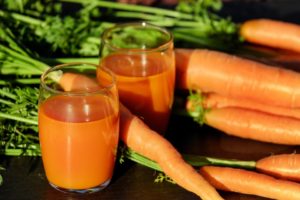
Recently, I’ve been asked many questions on nutrition and its role in natural vision improvement. One of the repeated questions is “Do Carrots Help Improve Eyesight?”
A real story. Eating carrots is a great first step to nurture your precious eyesight. My friend’s son Nico was born as a tiny preemie, two months before his due date. For many years, Nico ate so much carrot juice and carrot smoothies that his nose turned into orange color. But it worked for his eyesight! Nico was one of the only two kids who have normal vision at his NICU (neonatal intensive care unit) preemie reunion many years later.
Yes to carrots! Carrots are good sources of lutein and beta carotene, which are powerful antioxidants that benefit eye health, improve night vision, and protect against age-related degenerative eye diseases. The body needs fat to absorb lutein and beta carotene, so remember to eat carrots with some healthy fat such as avocado, olive oil, and coconut oil.
Nutrition-rich diet. Good nutrition is important for eye health, but carrot alone is not enough. A balanced and nutrition-rich diet is the answer. In today’s fast-food-, boxed food-, and processed food-dominated culture, many of us are overfed but undernourished. We are depriving ourselves of live and natural nutrients that are imperative to the proper functioning of our body and our eyes. In addition to carrot, I suggest you consume a rainbow variety of fresh foods that are essential for optimal brain and eye health. The red, orange, yellow, green, blue, and purple variation of vegetables and fruits offer vitamins, minerals, antioxidants, and phytochemicals—all of which have enormous healing powers.
Omega-3 fatty acids make up half of the fats in the brain and retina. The retina is the thin layer of tissue that lines the back of the eye on the inside. The retina contains photoreceptors that convert the light into neural signals, and these signals are sent on to the brain for visual recognition. These foods are high in omega-3 fatty acids: fish such as salmon, sardine, and mackerel; nuts and seeds such as walnut, flaxseed, chia seed, and hemp seed.
Food to avoid. Remember to avoid processed food, white sugar, white flour, and vegetable oils that are extracted at high temperatures as they all cause inflammation. Our body produces free radicals (unstable molecules) as natural by-products from the body’s metabolic processes and immune responses. Free radicals also come from fried foods, drugs, alcohol, tobacco, pesticides, and air pollutants. They can cause damage to parts of cells, such as proteins, DNA, and cell membranes, resulting in diseases. Antioxidants can scavenge free radicals, neutralize them, thus reduce the risk of chronic diseases. Eating a diet rich in antioxidants (especially from fresh vegetables, fruits, beans, nuts and seeds) can defend cells from free radical damages.
Check out the nutrition chapter of my book, an eight-month Amazon bestseller Habits for Better Vision: 20 Scientifically Proven Ways to Improve Your Eyesight Naturally.
